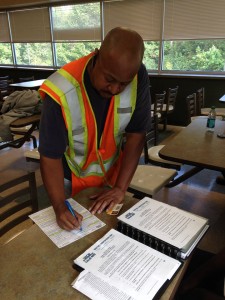- Sample New Member Meeting Agenda
- Sample Short New Member Orientation
- Sample Welcome Committee Conversation
Handouts and Print Materials
- Glossary of Labor Terminology
- This list of basic labor terminology can be helpful to help orient new members. Even though you’ve distributed the glossary, it’s still a good idea to avoid using too much labor-specific language when talking with any member unless you are sure they are familiar with the terms.
- UFCW Activist Passion Survey
- This survey is a great way to gauge the interest of not only to those new to the UFCW, but any member. Skills and interests change over time, and this survey can be a tool to periodically check in even after workers first join.
During the first few days and months after one of our members starts their new job, we have an important opportunity to reach out and make a strong relationship with them.
If workers primarily hear about the union from management instead of from us, they are much less likely to want to join and/or become active.
Some local unions have programs in place where staff conduct new member orientations. Others have stewards, E-Board members and other member activists lead these. Sometimes these meetings are held at the worksite in conjunction with management’s orientation. In other cases, separate meetings are held at the local union office or another location.
However your local approaches new member orientation, always consider how you can involve existing members in the process. Some locals have developed “welcoming committees” where members volunteer to be part of a group of co-workers who welcome new hires, share their own stories and learn about the recent hires. Some of the “welcoming committee” members may be stewards and some may not.
If in an “open shop” or right-to-work environment, it’s important connect with new workers right away and make sure they know what their rights are and why they should join with us. Even if they have a probationary period, becoming a part of our union and learning what we stand for from the beginning is beneficial in multiple ways (including management knowing our numbers and thus our power to make changes).
Like other member education, it’s important for new member orientations to be interactive, allowing for the recent hires to ask questions and share their thoughts and interests.
Many locals cover these topics:
- Introductions (name, worksite, job, what kind of work they’ve done before, if they’ve ever belonged to a union)
- Work issues the new members care about & issues that our union is currently working on
- Information and history about the UFCW and the local union (including info on their stewards and reps)
- What is a Union (working from the knowledge in the room and what it means to say “we are the union” and the role of members in building our power to make change)
- Basics of the contract and an overview of the bargaining process
- Union language (“steward,” “seniority,” etc.)
- How we enforce the contract (intro to grievances and using collective action to solve problems)
- Union dues (and initiation fee if applicable)
- Why politics and community action matters
- Special services and benefits of membership offered through the local and/or the International (some locals put together a package of such information)
- The union’s communication tools: worksite blackboard, newsletter, website, social media)
- Upcoming events, meetings, campaigns and other opportunities to be involved
- How the new members prefer to be contacted
- What the members are most interested in/ how they’d like to be involved
Use the Sample New Member Meeting Agenda and the Sample Short New Member Orientation to help you prepare for meetings with new members.
 Welcoming Committees
Welcoming Committees
One of the best ways to connect and build relationships with members is when they’re first hired. And the best situated people to do this are the new hires’ co-workers. At many local unions, stewards fill this role. In others, the role is shared with members who are part of a “welcoming committee.” A welcoming committee adds an additional tier of member leaders at the worksite, alongside stewards. Their role may be limited to welcoming new co-workers or may expand to also communicate with members during bargaining, elections and other key moments.
Some locals that establish welcoming committees spend a few months where the union reps/ internal organizers identify and recruit members and hold a training where they have the opportunity to practice their one-to-one conversation skills. Following this, the welcoming committee members are given the attached accordion flyers and a list of new hires during their shift. Staff people then check in with the welcoming committee members as to how their introductory conversations have gone and troubleshoot together.
It’s critical during this process that stewards are kept in the loop and also learn about issues and ideas raised during the welcoming committee members’ conversations with new hires. Depending on the size of the the worksite and the number of new hires, the welcoming committee’s interactions may be a one-time interaction or series of conversations. In right-to-work states, welcoming committee members may share why their union matters to them and why they decided to join. Welcoming committee members may also keep worksite bulletin boards updated, as well as other tasks, as determined by their own interest, as well as the needs of the stewards and staff. Welcoming committee members often help with recruiting new members to attend new member meetings.
This is a sample conversation that welcoming committee members may have with new hires. It is meant as an outline; when holding trainings with members, it’s important to help members feel confident about their own conversational ability– and to not worry about sticking to ‘the script.’ Most importantly, welcoming committee members should be encouraged to listen to their co-workers.
 Sample Materials for New Members from UFCW Local Unions
Sample Materials for New Members from UFCW Local Unions

